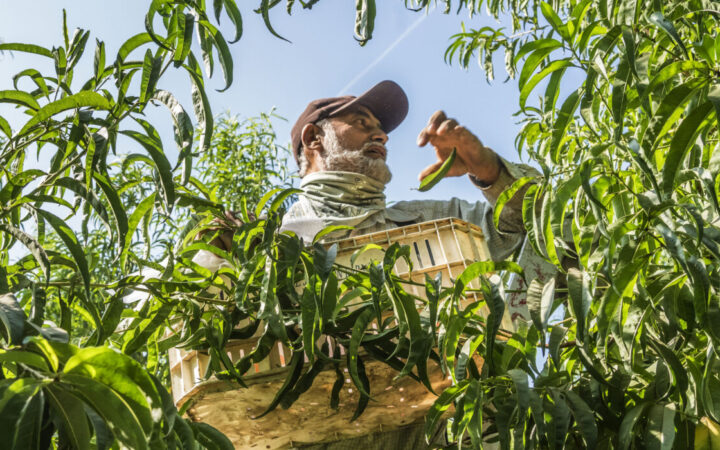This report explores gaps in U.S. laws and policies that put farmworkers at risk, specifically focusing on those that affect two of farmworkers’ most critical workplace hazards: pesticide exposure and heat-related illness. This report provides an overview of the findings as well as policy recommendations.
Introduction
Farmworkers are the foundation of a trillion-dollar industry in the United States yet face a level of occupational risk unrivaled by most workers. Despite their prominence within the nation’s food system, farmworkers are largely invisible to most Americans, as are their sacrifices and challenges. To some degree, the COVID-19 pandemic forced the country to reckon with the inhumane realities of food production; farmworkers were quickly deemed essential. At the same time, farmworkers contracted the coronavirus at high rates due to the lack of enforceable COVID safety standards, crowded and unsafe working and housing conditions, and delayed federal assistance. As our nation begins to reckon with its long history of pervasive and systemic racism, law- and policymakers must confront the fact that the vast majority of farmworkers are foreign born, identify as Hispanic or Latino/a, are not native English speakers, earn low wages, and have long worked under extraordinarily hazardous conditions. A smaller percentage of farmworkers identify as Indigenous with some identifying an Indigenous language as the one in which they are most comfortable speaking while some may speak a language without a consistent written form, which makes reading and writing in any language impossible. Over half of farmworkers are either undocumented or migrant workers thereby limiting their labor rights, as well as their willingness to exercise the limited rights they possess to report health and safety violations for fear of retaliation through immigration enforcement. Estimates suggest approximately 524,000 farmworkers are under the age of 18.
Farmworkers face many different workplace hazards including injury from heavy machinery and repetitive motion, and illness from exposure to zoonotic disease, pesticides, and heat. For migrant farmworker women, significant reproductive health issues are common. Children working in agriculture amount to less than 5.5 percent of working children in the country yet suffered 52 percent of work-related fatalities. Additionally, farmworkers often lack access to or cannot afford healthcare both because they earn extraordinarily low wages and due to rampant wage theft. Understandably, they may be reluctant to raise workplace concerns with their employers due to fear of retaliation. Climate change has exacerbated some of these conditions due to extreme heat and increased pesticide usage to combat the rising spread of pests.
Despite the significant risks associated with their work, farmworkers and other agricultural employees are excluded from many labor protections due to our nation’s long history of a food and agricultural system rooted in enslavement. While one of the concerns often cited in response to calls for farmworker occupational protections is the potential cost and burden placed on struggling farms and businesses, taxpayers already shoulder a portion of the costs associated with significant work-related injuries. Consequently, many have recommended preventive measures provide the most effective solutions.
Based on conversations with farmworkers and the advocates that work with them, this report considers federal and state law and policy measures addressing two critical workplace hazards— pesticide exposure and heat-related illness. While the federal government has developed a national scheme regulating pesticides in the United States, significant gaps remain. Specifically, many U.S. pesticide protections are focused on protecting consumers, the environment, and wildlife, but not individuals who are not the ones most often exposed to pesticides at dangerous levels—farmworkers and their families. Unlike pesticides, heat-related stress and illness in the workplace has not been addressed in any meaningful way at the federal level short of recommended guidance for employers. To provide law and policymakers with tools by which to consider a broader set of measures to address these critical work-related hazards, this report considers state laws and regulations that may fill gaps left by federal law and identifies opportunities and provides recommendations for additional protective measures.
Acknowledgments
This report was produced by the Center for Agriculture and Food Systems at Vermont Law School, in partnership with the Johns Hopkins Center for a Livable Future who developed a companion report documenting public health issues faced by farmworkers entitled “Essential and in Crisis: A Review of the Public Health Threats Facing Farmworkers in the US.” This report was made possible with support from the USDA National Agricultural Library.
This project was conceived of, directed, and implemented by Sarah Goldman, Senior Research Program Coordinator, Food System Policy, Johns Hopkins Center for a Livable Future who provided continuous oversight, research assistance, guidance, and feedback.
The report benefited from significant research, writing, input, and editing support from Tessa Pulaski, Summer Honors Intern, Center for Agriculture and Food Systems at Vermont Law School; and Cydnee Bence, LLM Fellow, Center for Agriculture and Food Systems at Vermont Law School. Additionally, the report benefitted from the assistance, cooperation, thought partnership, and feedback of Anna Aspenson, Program Associate, Food System Policy, Johns Hopkins Center for a Livable Future; Prashasti Bhatnagar, JD/MPH Candidate, Georgetown University Law Center & Johns Hopkins School of Public Health, Johns Hopkins Center for a Livable Future; and Robert Martin, Program Director, Food System Policy, Johns Hopkins Center for a Livable Future.
We thank the following people for reviewing this report: Iris Figueroa, Director of Economic and Environmental Justice, Farmworker Justice; Anne Katten, Director, Pesticide and Worker Safety Project, California Rural Legal Assistance Foundation; Marla Karina Larrave, Political Education Director, HEAL Food Alliance; and Margaret Reeves, Senior Scientist, Pesticide Action Network. The reviewers do not necessarily agree with the report’s arguments and recommendations but provided enormously thoughtful guidance and feedback on its content. They did not review the final draft. We thank them not only for their help with this report, but for the incredible work they do each day.
Thank you to CAFS Research Assistant Terr Ann Cambell for research and editing support.
Report Layout and Design: Kelly Cochrane Collar, Mad River Creative and Elias Vargas, original artwork.
Finally, and most importantly, we express our sincere gratitude to the farmworkers across the country who put themselves and their families at risk to feed, nourish, and sustain us.
Suggested Citation
Laurie J. Beyranevand & Lihlani Skipper Nelson, Vt. L. & Grad. Sch. Ctr. For Agric. & Food Sys., Essentially Unprotected: A Focus on Farmworker Health Laws and Policies Addressing Pesticide Exposure and Heat-Related Illness (May 01, 2021), https://vermontlaw.b-cdn.net/wp-content/uploads/2024/07/Essentially-Unprotected-FINAL-1.pdf




